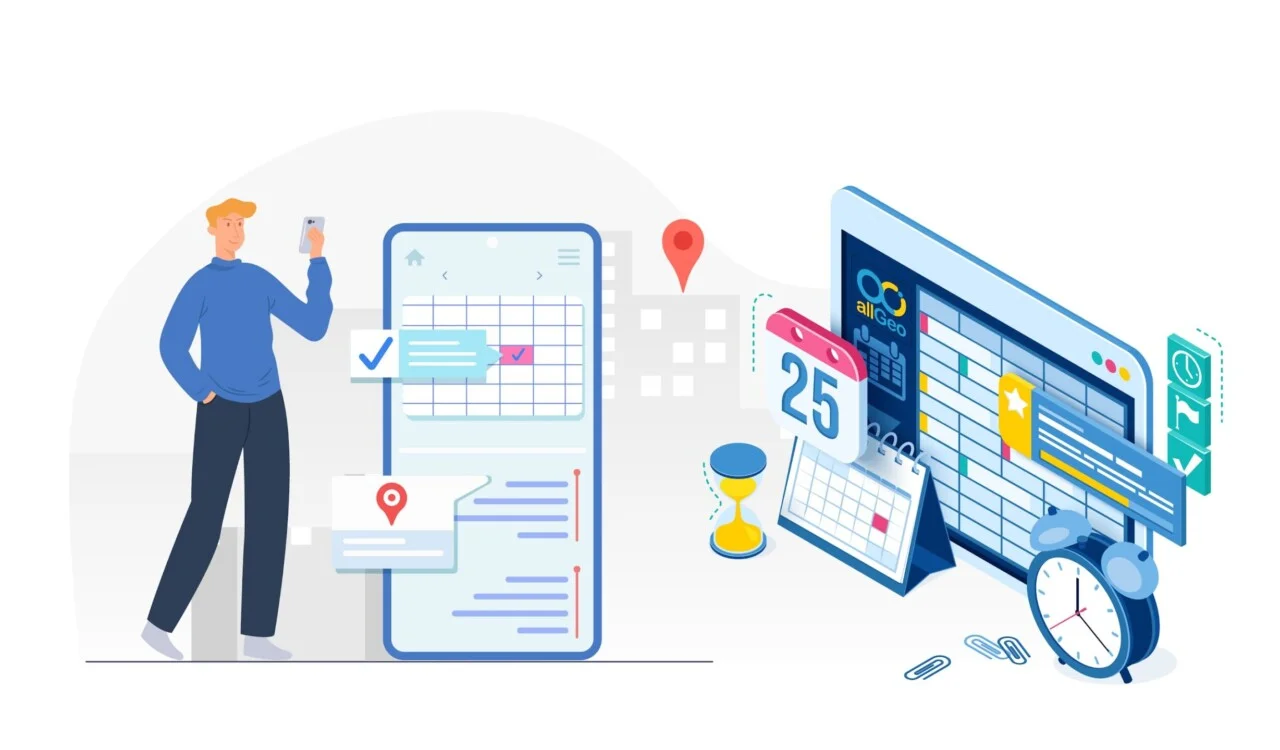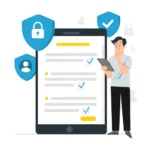Growth-oriented businesses are always on the lookout for potential areas of improvement. Time management with a GPS time tracking system can be your key to maximum productivity in the workplace. However, there is still a hesitation among some field service businesses to view it as a worthwhile investment.
The doubts often result from a lack of knowledge about GPS time-tracking apps’ capabilities. With it, you can analyze employee productivity, issue automatic alerts in emergencies, reduce unnecessary downtime, and provide valuable insights into working patterns.
Various field services companies manage their workforce with the assistance of real-time GPS time tracking. Workplaces are increasingly adopting the software due to the valuable data it can gather. Therefore GPS time tracking apps play a major role in ensuring seamless business operations. This represents a pivotal advancement in the industry’s technological landscape.
Many misconceptions about GPS tracking systems are due to a lack of understanding of the product and its solutions. These misconceptions can vary within an organization, depending on the roles of the employees involved.
If employees are not explained the usage of time tracking and GPS technology and how it can help them, it will raise concerns. Some workers may worry that it’s unethical and can cause mistrust in the workplace.
For instance, a construction worker might think of being monitored as a breach of privacy. A manager, however, could have concerns about how it might impact their daily tasks.
It’s essential to seek ways to collect analytics on performance, save time, optimize processes, and more. Time-tracking software serves as another valuable tool for achieving these optimization goals.
In this post, we will bust these common myths and misconceptions associated with GPS tracking systems.
Common Myths Associated With GPS Time Tracking Apps
- Time-tracking software is not any better than paper timesheetsSome argue that paper timesheets are just as effective as time-tracking software, as they have been the norm for many employers. But is it worth sticking to traditional methods?
To begin with, a physical piece of paper can be easily misplaced or damaged. In contrast, a digital log is far more resilient, especially when it’s securely backed up in the cloud. Manual entry of times on paper leaves room for error. Employees are also more prone to making mistakes or potentially inflating their hours, essentially engaging in time theft.Employees can benefit too from increased accuracy with time-tracking software. If an employee works just ten minutes of overtime, they might be less inclined to report it accurately on a handwritten timesheet. However, those extra ten minutes per day can accumulate into a significant amount of overtime eventually. Time tracking software ensures that employees are appropriately compensated for every minute of extra work.
- GPS time tracking apps invade privacyMany questions are raised about the privacy implications of time tracking and whether it’s legal for employers to monitor their employees’ online activities.In most instances, as long as the employer informs the employee that they are subject to monitoring, it is considered permissible. To prevent the risk of sensitive data leaks, many software manufacturers incorporate features that can disable screenshots or keylogging, safeguarding confidential information such as financial details.
Time-tracking software companies understand that the information you store may include confidential and sensitive data, ranging from your business’s email list to its financial records. They prioritize data security to gain your trust and provide assurance that your information is well protected.
For instance, employee locations will only be visible to those with admin-level access.
A GPS time tracking solution implemented on a mobile device will not monitor an employee who has clocked out. As long as the employer refrains from tracking the employee during their off-duty hours, the employee’s privacy remains safeguarded.
- Only employers benefit from time-tracking appsIt’s important to recognize that time-tracking software serves a broader purpose beyond employers monitoring their staff. It also serves as a valuable project tracking tool for employees to effectively manage their schedules.Employers can leverage this software to keep track of their hours and ensure they are effectively prioritizing tasks. It’s not about surveillance; rather, it’s a digital planning tool that seamlessly integrates with payroll processes.
Employers can and should utilize time-tracking software to monitor employee activity, not out of mistrust, but to provide the best possible support. For instance, in case of a hazard, it’ll be helpful to know the real-time location of employees.
GPS time-tracking technology benefits employers, employees, suppliers, and customers alike. Employers save time and reduce costs, employees receive accurate compensation for their hours worked, administrators gain clarity on employee locations for better supply management, and customers enjoy improved service from connected workers who remain in close communication with administrators.
Conclusion
Implementing employee time tracking is an efficient method to document working hours. It enhances accuracy, saves time, and furnishes essential data that can assist in optimizing task allocation.
Time tracking, whether through software or GPS technology, isn’t just about monitoring or surveillance. It’s a valuable resource for enhancing productivity, optimizing tasks, and ensuring fair compensation. Employers can use these tools to support their teams and streamline operations, while employees can benefit from accurate tracking of their hours.
Before adopting employee time tracking and GPS technology, it’s crucial to share its importance with your workforce. It creates a sense of collaboration and understanding, ensuring that the implementation process is smooth. It will also maximize the advantages for both- your company and workforce.
As technology continues to advance, tools like time-tracking software and GPS technology can contribute to more efficient and transparent workplace practices. It’s a step toward a future where businesses and employees can work together seamlessly, leveraging the power of data for mutual benefit. Consider making time tracking a permanent part of your workplace today.

